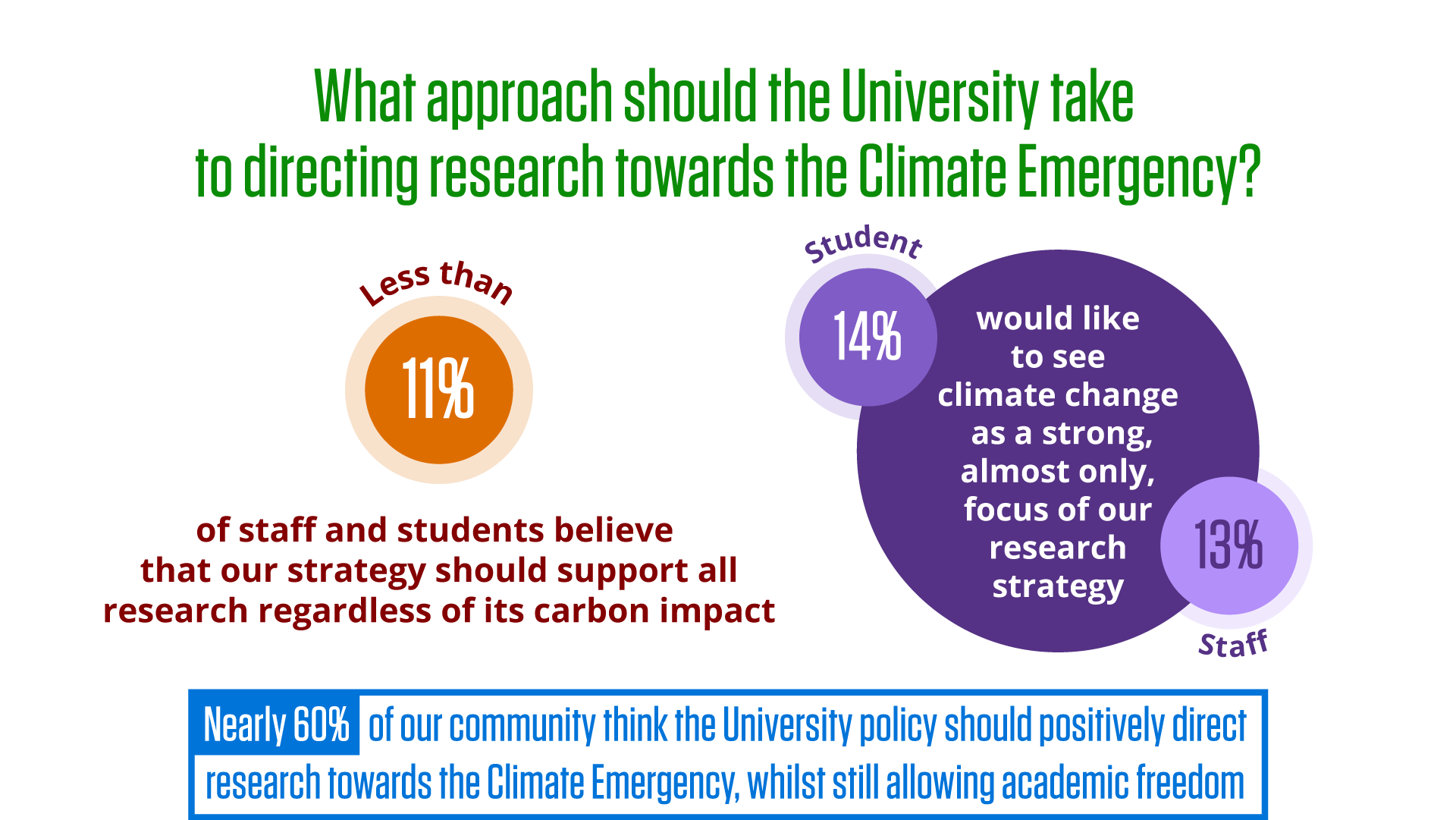The 2021 Climate Action Survey results show our community believes research that positively focuses on addressing the climate crisis should be incentivised.

Our University is a hub of research and teaching. As a large organisation, we are also responsible for significant carbon emissions , which contribute to the planet’s climate crisis. However, through our research, we can – and do – make significant contributions to reducing carbon emissions in wider society.
Results from the 2021 Climate Action Survey show that staff and students together are aligned in their opinions on University research policy, finding that 60% of respondents believe the University's research strategy should offer light or moderate boundaries that allow for academic freedom, whilst rewarding research that positively focuses on addressing the climate emergency. A further 14% of students and 13% of staff believe that the University's research strategy should strongly directs investment only towards research that directly contributes to addressing the climate emergency whilst allowing other research which is compatible with a 1.5% World.
This figure was higher than those who believed staff should be able to pursue any research interest they wish, regardless of the impact (positive or negative) on the climate emergency (<11%).
Directing research towards major challenges
The University is responding to climate change with multi-disciplinary and high-impact research across a range of disciplines. But University research policies cannot mitigate climate change unless they are put into action. Our Climate Action Framework commits to “delivering programmes with a sustainability agenda” and alongside our teaching and research centres, we are also directing research towards climate-related challenges through the Bath Beacons and the GW4.
In 2021 the University established the multidisciplinary Bath Beacons initiative to empower our research community to tackle major global challenges by building consortia for large-scale funding. The five initial Bath Beacons, commencing with one-year pilot study initiatives, include three (Future Fuels, Living Well Now and In 2050, and Sustainable and Automated Transport) that have a research focus on the climate crisis.
Reducing the climate impact of our research
Alongside the content and impact of our research, we are also looking at the carbon impact of how we conduct our research and how we can minimise any emissions resulting from doing that work.
In 2021, we launched a pilot of the Laboratory Efficiency Assessment Framework (LEAF) with labs from across our faculties. This began a trial programme of work exploring the potential to reduce the environmental impacts of our laboratory work. With the results from this initial programme, we plan to start rolling this out across the University in 2022/23 and hope it will give us the opportunity to reduce the climate impact of all our research across campus, as well as address wider sustainability issues.
Reducing the climate impact of research equipment procurement, operation, and maintenance can be achieved through greater sharing of suitable facilities across the university, following the principle that the greenest research equipment is the one you don’t buy, which we explored in previous blogs.
Reducing footprint and increasing brainprint
With our education and research capabilities, we have the opportunity to lead the way when it comes to lowering our global footprint. Carbon ‘brainprint’ is a term used to describe the estimate of the potential carbon emissions savings from future implementation of a piece of research. As we export technology and expertise overseas, we can demonstrate the reality of a low carbon economy through our own actions.
Although there is a lot more research to do in this area, early findings from Cranfield University show that by reducing our carbon footprints, and increasing our carbon brainprints, we can be a key part of the solution to climate change – it’s not rhetoric, it’s reality. This latest campaign from UUK shows the importance of the HE sector to addressing climate change.
Leading climate action through research
The climate crisis is the single largest threat to a prosperous future for us all, and our survey results show that both staff and students are aligned in their beliefs that the University should look toward rewarding more climate-focused research.
Our University has a wealth of knowledge that can be used for good in the fight against climate change. By putting sustainability at the forefront of how we operate as an institution and how we conduct future research and educate students, we can all help to act as a catalyst for meaningful and lasting change in the fight against the climate crisis.
To stay up-to-date on the latest developments from the Climate Action team, visit our climate change hub.
Notes about the survey
-
This survey was conducted in November 2021.
-
This survey was completed by 3985 respondents, representing 39% of University staff and 11% of students.
-
This survey was commissioned by the Climate Action team with methodology devised and results analysed by Dr Paul Haggar, Prof Lorraine Whitmarsh, Kaloyan Mitev and Hannah Lester.
-
The collated survey data can be accessed by members of the University of Bath community here.
-
If you have any questions about the nature of this survey, please contact climateaction@bath.ac.uk
Responses

Speaking as a climate activist, it's good to find such an important approach to climate change. I personally look forward to following this research.
Eric Apperley Architecture and Building Services 78 - 82